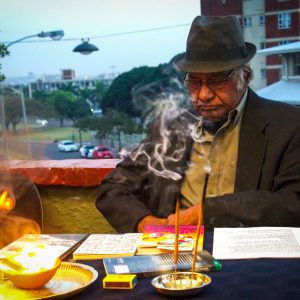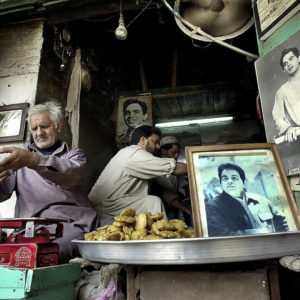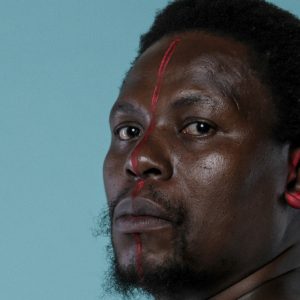‘Flowers’ for founder of the ‘theatre of resistance’
Inspired by a specific play in the 1970s, Maishe Maponya decided to write and stage works of his own. He would later go on to collaborate with, and inspire, many others, even beyond South Africa’s …
Author:
13 August 2021

Maishe Maponya will be remembered as one who, with profound eloquence, spoke and wrote truth to power. Whether in his plays, poetry or activism, Maponya’s aim was clear: to expose and illuminate the condition of Black people in South Africa and, hopefully, change it for the better.
A towering colossus and quietly domineering force with uncanny Dionysian qualities, his seems a life almost predestined, as someone who encountered theatre only relatively “late” in his life. What cannot be disputed, given his extensive oeuvre, is that Maishe Maponya took to the theatre with force, shaping his works as a political weapon against oppression.
Related article:
In an interview with Peter Bode for Theatre Lives, Maponya said he first became aware of theatre in the early 1970s in Diepkloof, Soweto after his family was forcibly moved there from Alexandra. He saw Sam Mhangwane’s play Unfaithful Woman, performed by the Sea Pearl Drama Society.
Maponya’s interest in “serious involvement” in theatre was sparked around 1975 when he watched Give Us This Day, a musical play by Mzwandile Maqina performed at the Donaldson Orlando Community Centre in Soweto. The production centres on the life and death of Onkgopotse Abram Tiro, a South African student activist and Black Consciousness proponent who was killed by a parcel bomb sent to him by the apartheid government in Botswana in 1974.
Early days and inspirations
Maqina, an early playwright and theatre director, who also happened to be a reverend, is widely accredited as one of the pioneers of South African political theatre. Give Us This Day was written sometime in 1974 and performed between 1974 and 1976. It was banned in May 1976. Like some of Maponya’s later plays, it became the first theatrical production to be banned under apartheid.
Watching the play left an indelible mark on Maponya. It would shape his acute awareness, and relentless preoccupation centring the condition and lives of Black people in his work.
In the interview with Bode, Maponya said that while watching Give Us This Day, he decided he needed to meet the writer and actors. And, over the next few days of its run, he was instrumental in getting the community to come in their numbers to watch it. He even convinced some of his colleagues at Liberty Life Insurance, who were not exposed to Black theatre, to watch the production. Such was his belief in the brilliance of what he had witnessed that he even offered to pay for them to watch. And, if they paid and were not happy, he committed to reimburse them.
This was the making of Maishe Maponya, the arts administrator and cultural activist.
Related article:
One could say Give Us This Day gave Maponya an example of the kind of theatre that mattered, the kind he would make throughout his life. This was theatre focusing on the struggles of Black people – theatre which was political. Though carrying themes of protest, he refused to label any of his works “protest theatre”. He preferred the term “theatre of resistance”.
Without any training, experience, or knowledge of the “rules”, Maponya wrote his first play The Cry in 1975. Upon presenting it to people like Ramolao Makhene, Arthur Molepo and George Lamola – prominent actors at the time – he says they felt the play was “more dangerous” due to its political content and therefore refused to participate. This could have been where the idea of forming his own troupe was mooted.
Maponya’s fierce insistence on his independence, the right to criticise and artistic licence echoes the politics and title of one of his heroes’ seminal essay collections, Steve Biko’s I Write What I Like. Maponya’s artistic insistence, however, would come at great personal and professional cost.
Core works and impactful productions
Maponya went on to write other plays, including Peace and Forgive (1977), Umongikazi: The Nurse (1982), Dirty Work and Gangsters (both 1984), Changing the Silence (1985), Busang Meropa (1986) Jika (1988) and The Coat (1990).
However, it was The Hungry Earth, written in 1979, that would bring Maponya critical acclaim, making him a target of apartheid’s Security Branch. The play, largely about the plight of Black mineworkers, was inspired by Bertolt Brecht’s The Measures Taken. It toured Britain, France and Germany. But it was first presented at the Moravian Church Hall in Diepkloof, Soweto, by Bahumutsi Players, a troupe Maponya formed, directed and acted in.
In 1985, he became the first Black person to be awarded the Standard Bank Young Artist award for drama. He had staged Gangsters and Dirty Works in 1984 at The Market Theatre. Gangsters were deemed so inflammatory by the Directorate of Publications that it could only be performed “in small intimate, four-walled theatres of the experimental or avant-garde type”. No such spaces existed in the townships.
Related article:
Ismail Mahomed, former National Arts Festival artistic director, wrote in a tribute to Maponya on his Facebook account: ”Gangsters and Dirty Works was an exposé of the Security Police. It was as fearless as all his other works.”
Speaking to Bode, Maponya said he was proud to cause a “revolution” by staging this kind of work which had never been seen before at the National Arts Festival, and which “made white people uncomfortable”.
Phyllis Klotz, playwright, writer, educationist, and co-founder with Smal Ndaba of the award-winning Sibikwa Arts Centre in Benoni, first met Maponya in 1986, at the then Grahamstown Arts Festival, now National Arts Festival Makhanda. Maponya was presenting Bušang Meropa (Bring Back the Drums), and Sibikwa Arts Centre was staging Strike. “Maishe was incredibly supportive of the three women in Strike and the production itself. He would offer them advice as they were new in the field and tried wherever possible to assist,” she said.
Working with others
Supporting, working, and collaborating with other artists was important to Maponya. His earliest creative collaborators included playwright Matsemela Manaka, poet Ingoapele Madingoane and trade unionist Makhulu Ledwaba. With these three, he founded the Allah Poets in the mid 1970s.
Maponya chose Sibikwa Arts Centre as the host for the launch of his poetry anthology Truth Be Told: Da’s Kak in the Land in April 2019, because he “was adamant that artists should be supporting alternative venues and move away from the mainstream”, Klotz said.
When asked by Bode what he would like to see happen in theatre in South Africa, Maponya said he would want “well-resourced community centres” in the townships, further showing that for him real development could not be possible without uplifting the townships by building infrastructure.
Zimbabwean-based South African lecturer, director, poet and playwright Robert Mshengu McLaren, of the famed Workshop ‘71 theatre project, led the charge for Maponya to be “given his flowers” while he was still alive. He started the “Halala Maishe: Celebrating Maishe Maponya” Facebook page, bemoaning the artist’s lack of recognition as an African cultural giant.
Related article:
Albert Nyathi, the celebrated Zimbabwean poet, musician, writer and actor met Maponya at the University of Zimbabwe in the 90s when he was a student there, and cites him as an inspiration. About their encounter, he said, “I was instantly impressed – such a talented African brother… I [wish]I had a chance to work with him.”
Daniel Maphosa, actor, writer, founder and director of Harare-based Savanna Arts, met Maponya when he ran a workshop at the Children’s Performing Arts Workshop (Chipawo), in Harare. He would later invite Maponya to run theatre workshops focused on regional collaboration and networking in 2012.
This initiative led to the formation of the now annual Southern African Theatre Camp that has participants from all the Southern African Development Community countries. About the seven-day playwright workshop that Maponya conducted, Daniel said, “Maishe was knowledgeable about the arts and political economy of the arts… [and] his humility, the environment he created in the workshops enabled for learning while playing.” This showed Maponya’s acute understanding of the importance of adult education and the critical role of the arts in human development.
Related article:
Maponya would visit Zimbabwe again in 2011, at McLaren’s invitation. There he was the dramaturg for the South African group while they worked on Henrik Ibsen’s An Enemy of the People, relating its theme to the South African social and political landscape.
His last artistic offering was Truth Be Told: Da’s Kak in the Land in 2018, a stark, frightening and enduring indictment of the contemporary state of his beloved South Africa.
Now that Maponya is an ancestor, the words of McLaren’s powerful poetic tribute Khahlamba’s Rainbow, to his munin’ina or small brother, are a stirring injunction:
Wena Maishe, Maponya’s son:
We shall never forget you
Truthteller then and truthteller
Now. Maatla! – all power
To our people, all power!





